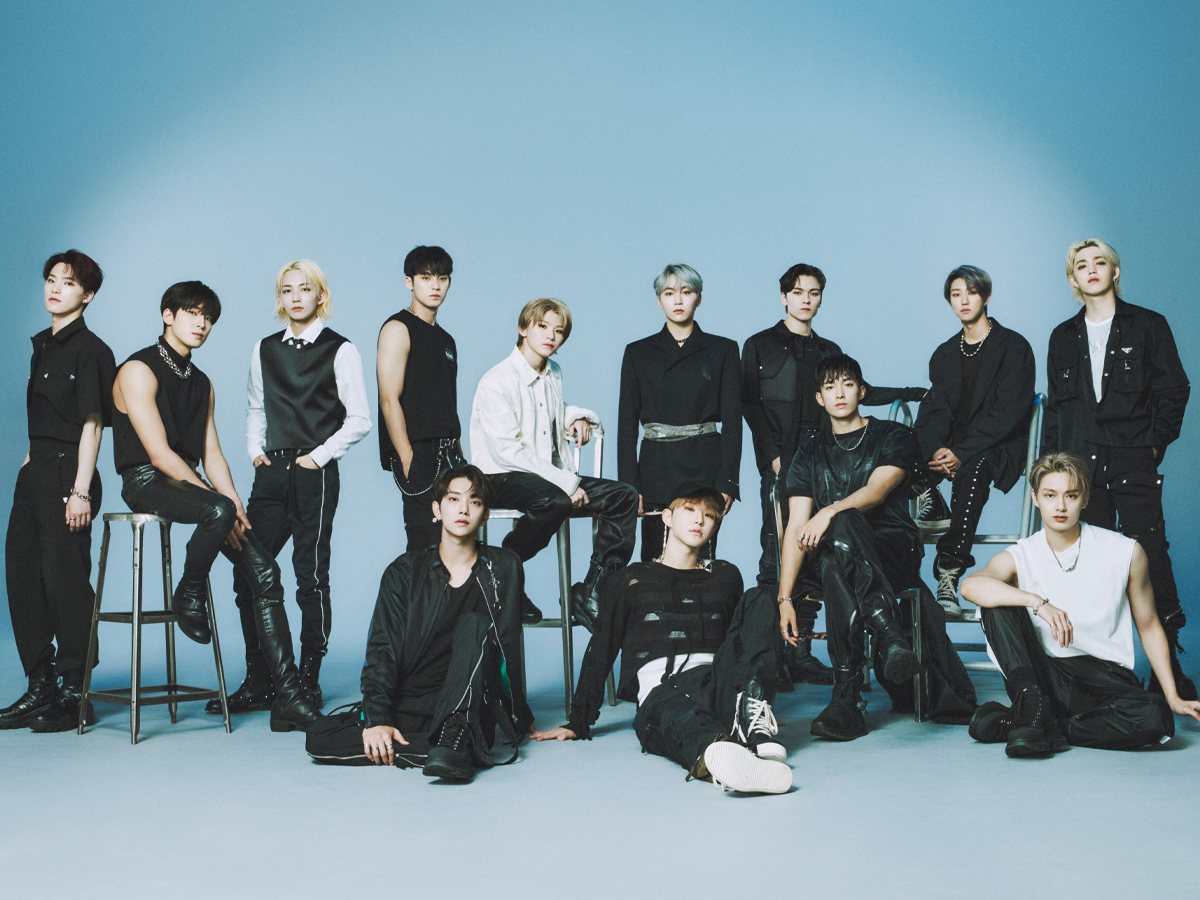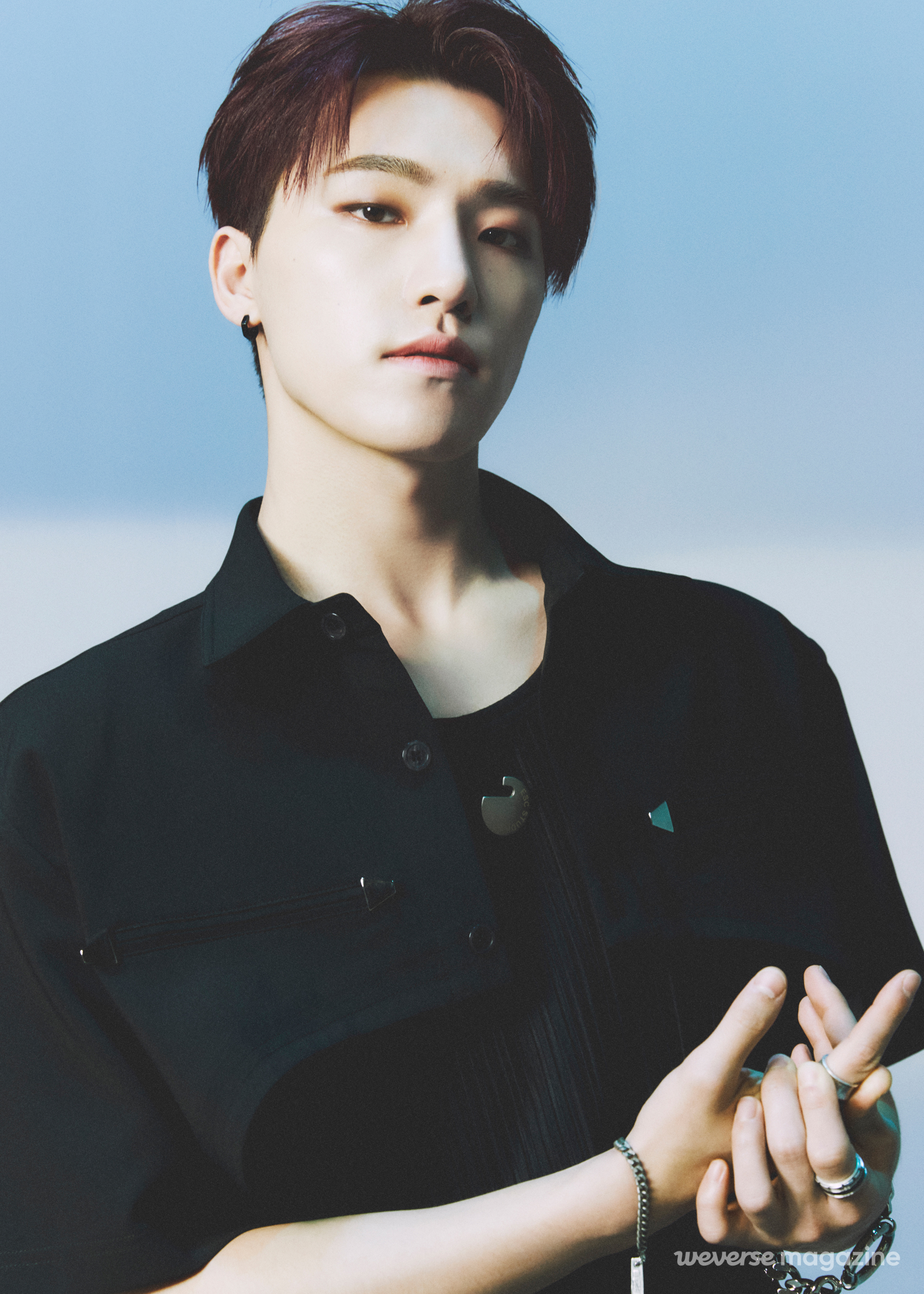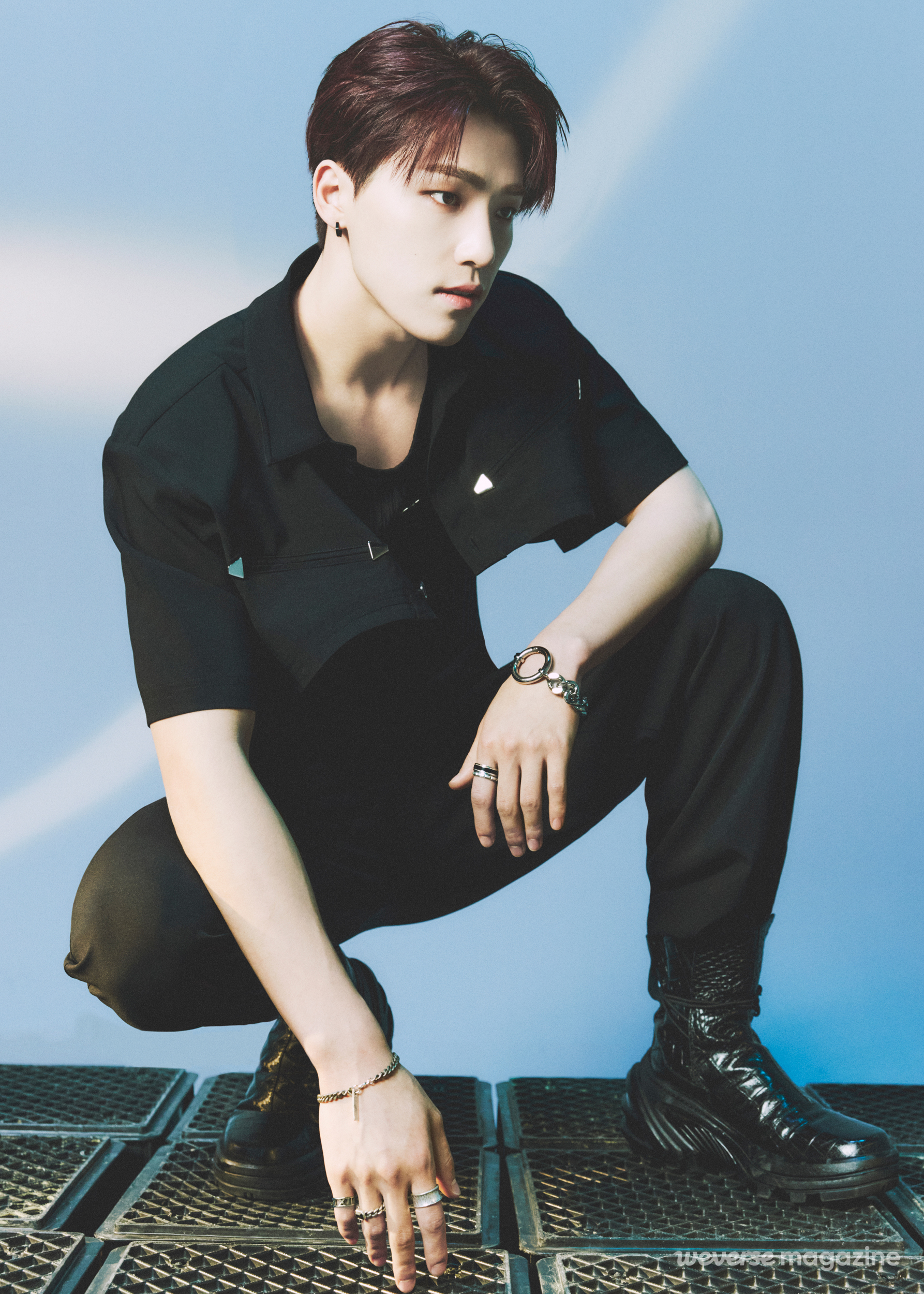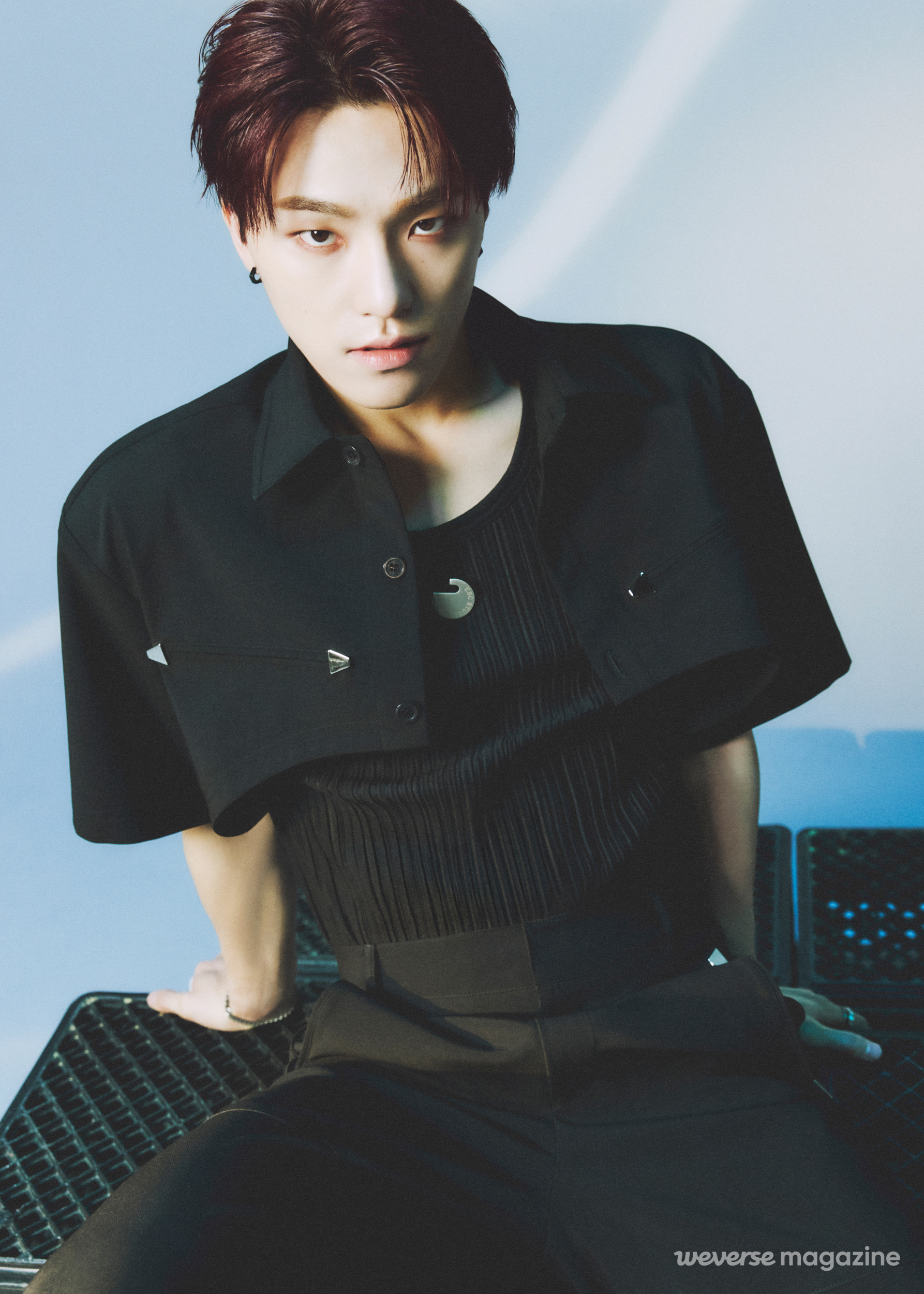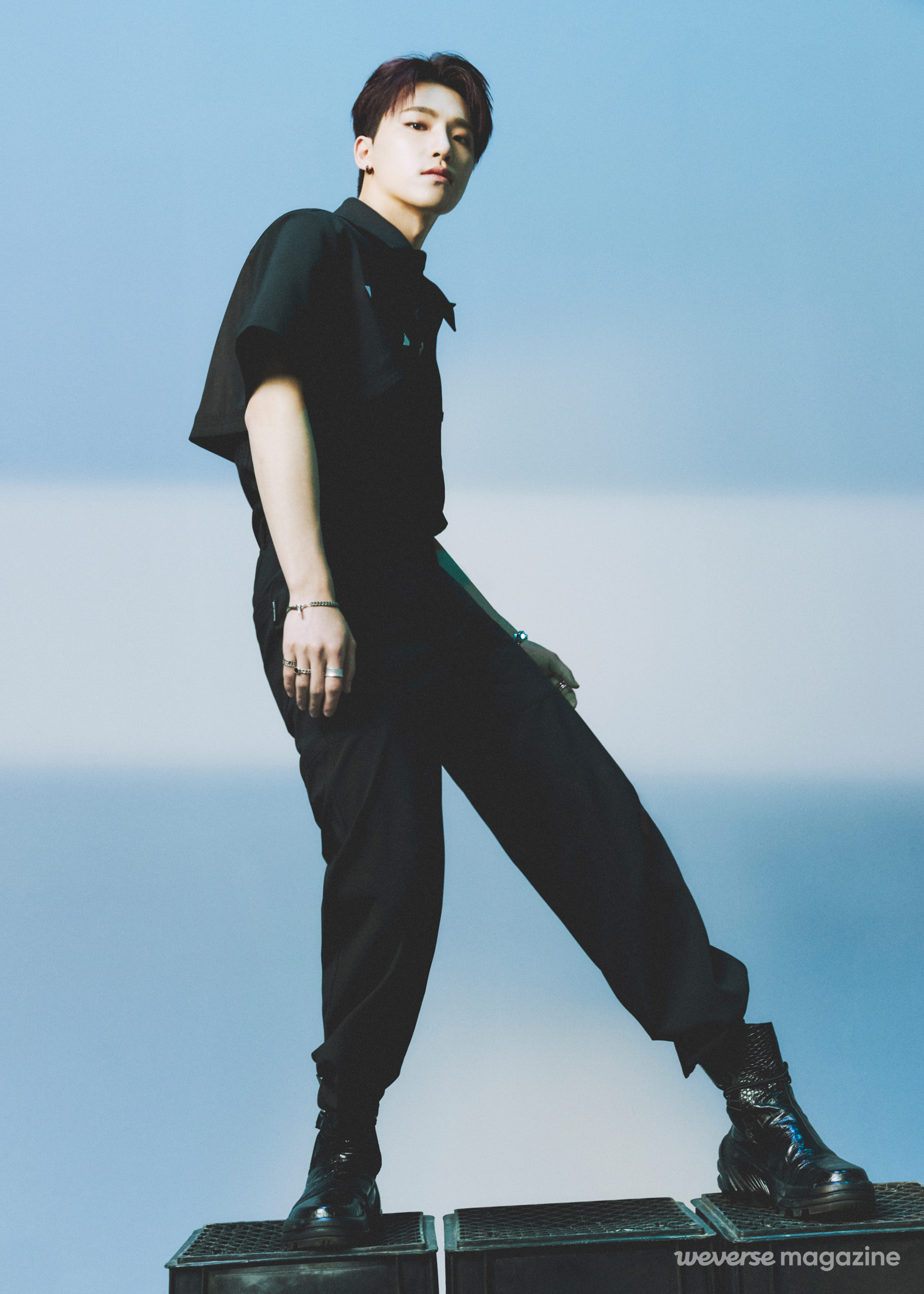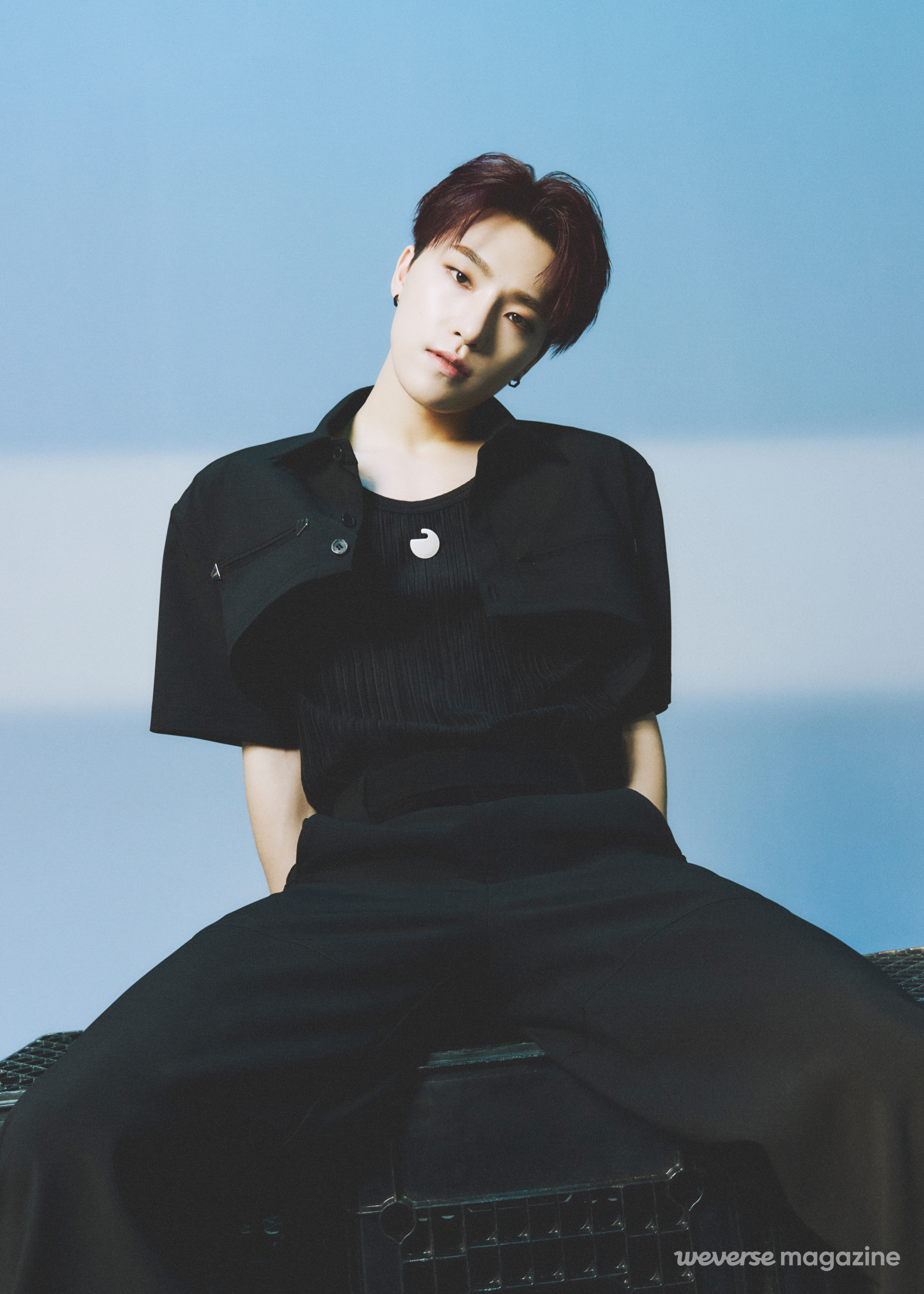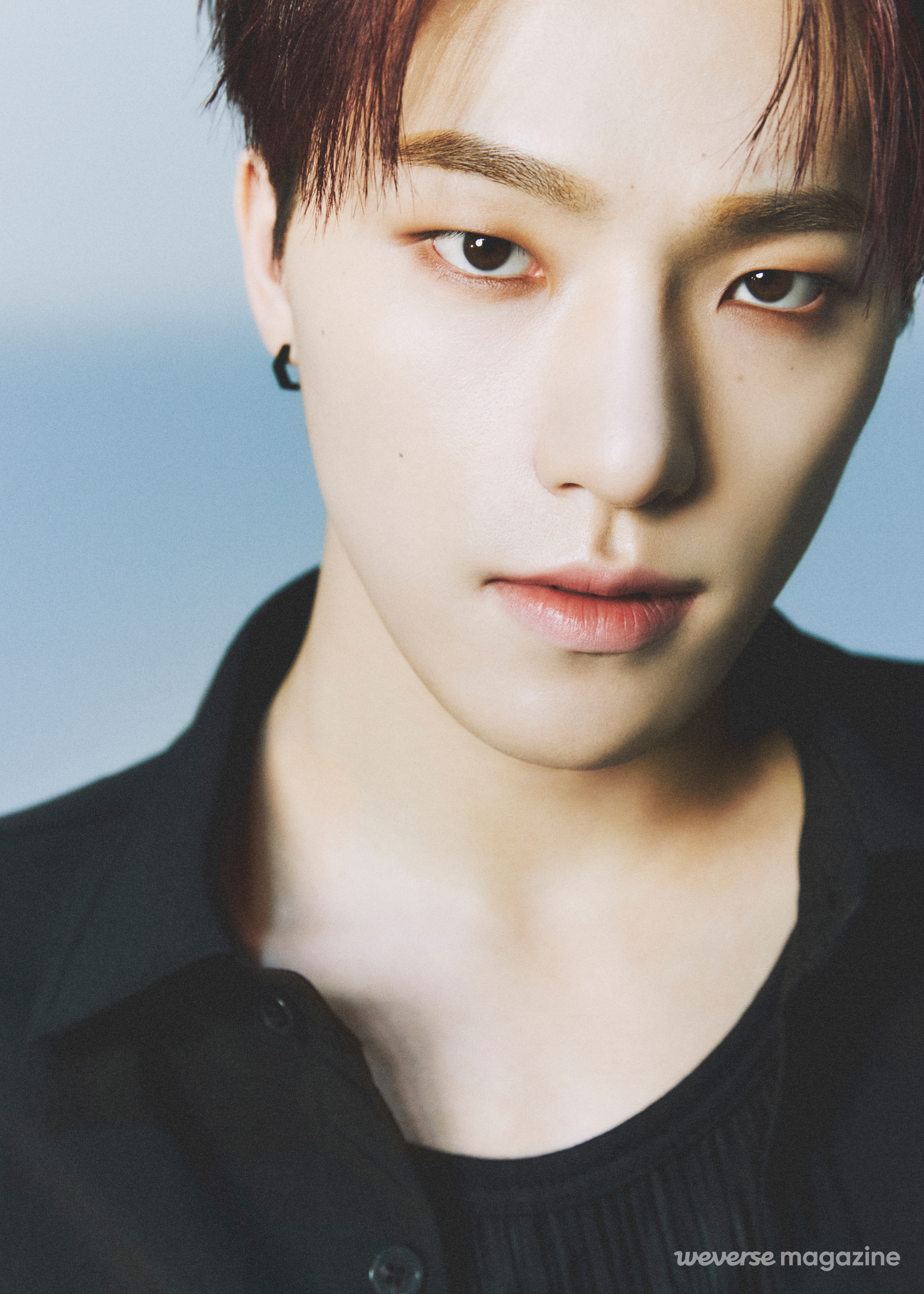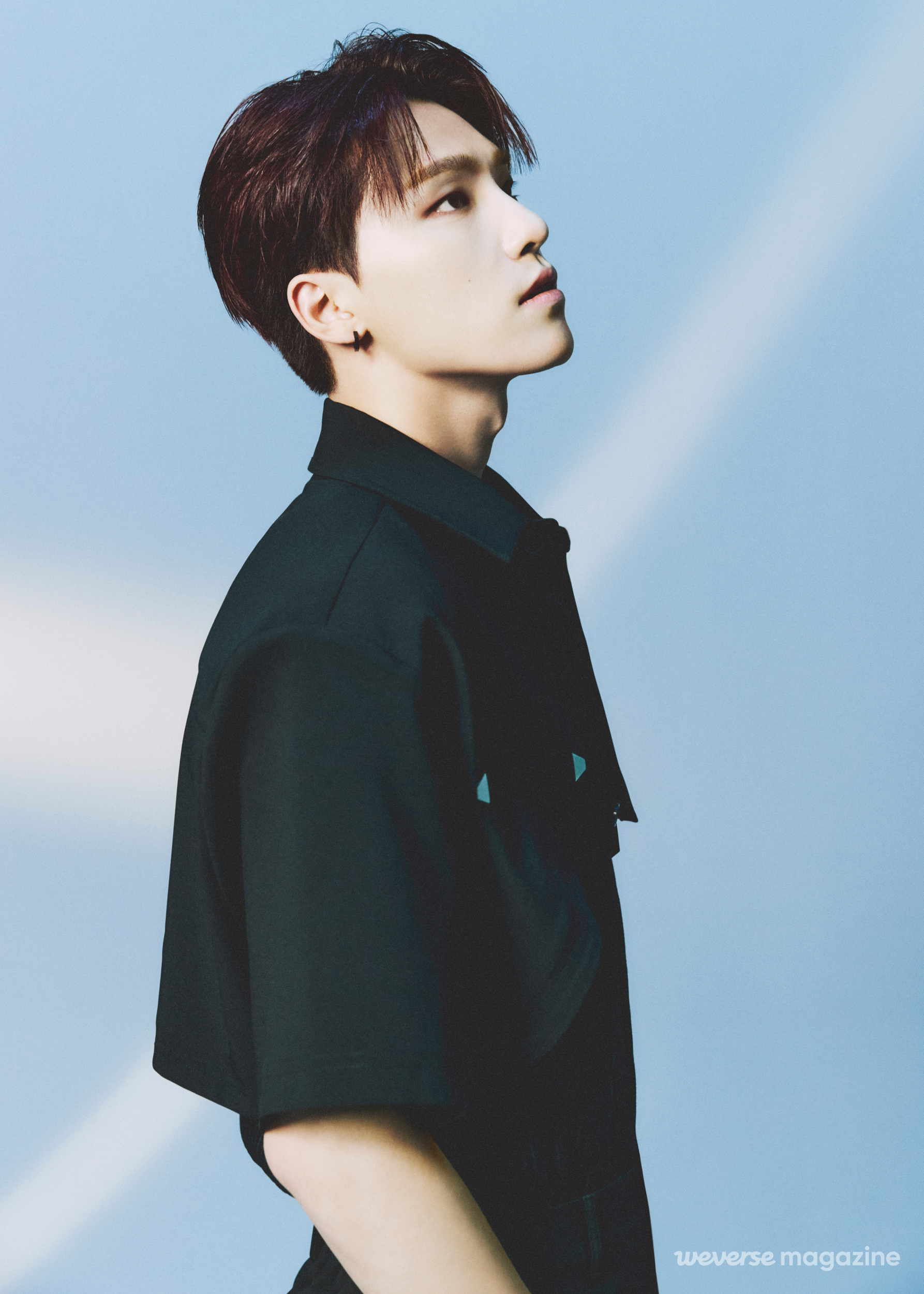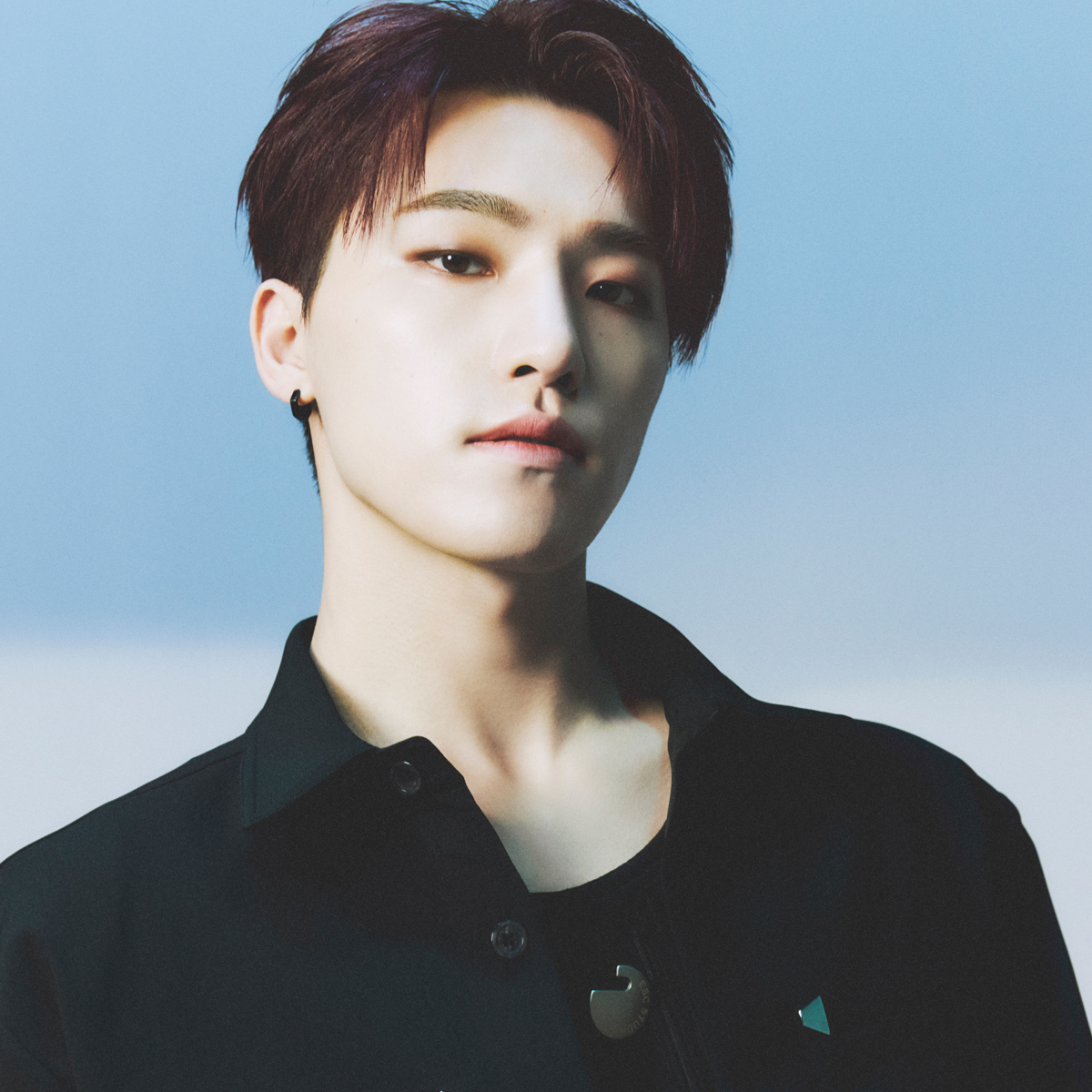
DINO said he wants to be good at dancing, singing, entertaining, acting and everything else. When asked what his next goal will be, an excited smile spread across his face as though he were a boy waiting to go on a picnic. “I’m going to keep seeking out new things to keep my passion burning.”
How are your pet plants doing? Are they growing?
DINO: There’s one big guy and some smaller ones, but the big one isn’t doing so well these days. I opened up the curtains when the sun was at the right angle and made sure to water them, but I guess I sort of neglected them the busier I got. I learned you have to give them attention constantly.
What made you become interested in plants?
DINO: It’s all tall, gray buildings outside, so I wanted to spend my time in a natural green space when I’m at home. I gave carnations to my parents for Parents’ Day, but I got them in a flowerpot instead of giving them a bouquet.
The performance team’s song on this album, “Wave,” talks about leaving the city for an ocean in the mind.
DINO: I liked the idea of waves that HOSHI came up with. We actually added real wave sounds to the song. I helped write the lyrics and I really wanted to use the word “tide.” I lightly suggested that we change the words from “following the feeling” to “following the tide.” I like that it rhymed better with “dance routine” in the next line, too.
In “Ready to love,” the lead single, you sang the high-pitched part of the second chorus.
DINO: It was difficult since it’s so different from my normal range and I could’ve done better, but it was still fun. I like taking the time to try new things. I’ve been doing a lot of personal projects lately. I was focusing on how to shape and style my vocals, which helped me when I was recording this new album.
The performance for Rolling Stone’s In My Room showed that the performance team is good at more than just dancing.
DINO: That was an amazing experience for us. Since that series focuses just on the singing, and there’s no dancing, we thought we could show off a different side of the performance team, so the four of us chose “Lilili Yabbay” since we like that song and felt the most confident about. The units are supposed to emphasize every member’s strengths, but we think about what kind of music we want to do and what kind of singers we want to be regardless of the unit names.
But you still seem to feel a sense of responsibility about the performance. HOSHI said in one interview that you’re “the four who have it hardest for concerts.”
DINO: I couldn’t agree more. (laughs) It’s not like other units don’t have it hard too. They sometimes sing without dancing or move around freely after the intensive group performance is over but the performance team doesn’t have that option. One time I was out of breath between performances while the vocal team was singing while sitting down. I was like, Wait—you get to sit down while you sing? (laughs)
Everyone’s always looking forward to a high-quality performance. You don’t feel any pressure from that?
DINO: That’s the reason I started DANCEOLOGY. I felt like I needed time to dance entirely for my own enjoyment rather than just what others would like. I was so glad CARAT enjoyed what I came up with, too. It gave me a lot of confidence.
It can’t be easy for you to keep going with DANCEOLOGY in addition to everything you do with SEVENTEEN. When you were in Japan, you shot “Sucker” by yourself while everyone else was taking the day off.
DINO: I wanted to shoot it the day before but I couldn’t because of the rain. I thought I was going to have to go back without shooting it but I managed to shoot it in Okinawa on the last day. Even though the other members had the day off, they all came to the shoot and supported me so I could wrap up quickly and take a little break at least. It’s not easy choreographing, filming and editing all while doing SEVENTEEN work too, but I keep it up anyway because it’s fun.
When it came to “Feeling Good,” you created a classic dance routine and put it on top of a jazzy song.
DINO: When I first did “5 in the Morning,” I packed so many moves into every beat that it took me over 30 minutes just to get through two bars. Then I wondered what I could do better. I needed something new and I started working with an instructor who teaches Korean traditional dance, so I took on a completely different genre. I used to only care about the beat and detailed movements, and then suddenly I was struck with this whole new thing. The techniques were basic and the important part was to communicate through the dance. The choreography for “Feeling Good” was a breakthrough for me. I learned how to be true to the way I feel in the moment.
It feels like you were trying to express something a bit emotionally deeper with your choreography for “Thin White Lies,” since it describes the pain associated with becoming gradually more isolated.
DINO: My idea was a big frame that suffocates me as it gets narrower, and just when I think I finally got out, I’m still trapped in there. I wanted to express what I was feeling around that time. As the years went by with the team, it felt like every day was similar and I was trapped. I didn’t want to hide my feelings in the very project I started in order to express myself. I’m gonna be honest. I’m gonna reveal myself through dance, basically.
You made the message easy to understand, not just through the choreography, but also with the direction, like the white frame on the stage, the narrow square pin lights, and stepping on the narrow white line again at the end.
DINO: The stage was laid out so it’s immediately obvious that big frame is getting progressively narrower. If people are just worried about why I chose to dance a certain way their minds could wander, and then they might forget the dance itself and rely on the interpretation alone or end up not looking at the dance at all. But I think the viewers’ first impressions matter too. They’re just as important. I don’t want the people who watch my dance to get a headache.
How would you describe DANCEOLOGY? Some people have even covered your videos on YouTube.
DINO: It’s a record of myself and a cover letter to showcase myself, or the diary of a dancer-singer. I don’t have to get approval from anyone (laughs) and there isn’t pressure like when we plan the group’s choreography. It’s so fun that it melts my stress away. It helps to make it possible to keep going with SEVENTEEN work.
Do you notice any changes when you look back through your DANCEOLOGY diary?
DINO: It feels like I’m a little more relaxed now. I mean, when I look at performances from around the time we debuted, there’s times when I’m overdoing it. (laughs) But it’s thanks to moments like that that I could get to where I am today. I think I can control my tempo quite naturally now.
Does the “laid back” dancing you do enter into your being more relaxed? During “Mafia Dance,” THE 8 said, “DINO is the only one in our group who lays back.”
DINO: Laying back is when you hit the last beat in time, but you delay the beat before it a little and make the time between those two beats a little shorter. It might sound complicated, but there’s nothing special about it. It’s honestly the same move, but for some reason, it just looks cool? (laughs) I feel if you lay back it amplifies the move and it’s great to look at, so I make sure to do it well.
I heard you started to learn acting so you could improve the way you express yourself during performances.
DINO: Last summer I realized that I kept looking into the camera with the same expression even though the songs and concepts were different. I felt I was holding myself back so I went to our acting coach. I told them my goal and they made up a class outline that focused on descriptive acting. It’s a way to express a given situation or emotion with your whole body without saying a word. Your concentration goes up when you act, so you can immerse yourself in a situation, even if it’s just for a short time. The coach complimented me, saying I’d probably be in a TV show next. I was like, “Come on—no way.” (laughs)
Judging by the way you look for new things to learn, I’m guessing you’re the type who is never satisfied and always needs to do more.
DINO: I guess I do have that kind of impulse. I feel like I’ll slowly go downhill if I just pass the time without making any changes. And I’d feel like I’m only limiting myself. When I was a trainee I was especially desperate. I wasn’t in a place where I could reflect on myself and I wasn’t old enough either, so I lingered on every little thing. It’s because I wanted to do a good job. There was a time when I couldn’t let go of my lingering thoughts and held onto too many things, but I think now I learned how to let things go little by little.
It’s impossible to turn a painful experience into a cause for laughter without that power to let go. In the “Ad-lib: SEVENTEEN’s Got Talent” episode of GOING SEVENTEEN 2020, you played “the Great Lee Chan” and reenacted the experience you had when you failed your audition at age 13.
DINO: Everybody probably already knows anyway since it’s all documented, but I thought CARAT could feel embarrassed for me if I seem embarrassed about it. It’s in the past, and it’s an interesting memory because what Lee Seung Hwan said actually came true. He said I would become an idol in seven years, and then three years later I debuted with SEVENTEEN. I put a lot of effort in when we film GOING SEVENTEEN because I’m determined to make people laugh. (laughs) While we were on set, I tried to think of which song the other members would react to best, and ended up going with “So Sick” by Ne-Yo since I used to like singing it when I was a trainee and the members would remember that. I still had a long way to go back then.
The way you give the other members earnest compliments and long answers to any questions the crew ask you makes it seem like you’re looking for funny ways to avoid hurting their feelings and keep things interesting and energetic.
DINO: When I stop to think about it, I feel like I have a strong tendency to think only about myself. Strangely enough, though, I keep caring about other people’s feelings. Maybe it’s somewhere in my wishes or desires that I hope the people I like are happy.
You and SEUNGKWAN in particular have a unique kind of relationship. Lots of people like the way you two joke around.
DINO: We bicker when we’re in front of the camera, but don’t be fooled—when we’re off-camera, we get along well. (laughs) I like him as one of the members and cherish him as a person. When we first met when we were trainees we couldn’t live without each other, but as we grew up we found out our personalities and our values are completely different. I’m more of a “you do you, I’ll do me” person, but he likes taking care of other people, so we actually fought a lot. Like, to the point that we didn’t speak to each other for two months. I think figuring each other out that way led us to where we are today—the way we get along well now.
In the GOING SEVENTEEN 2020 “High Sky and Plump Horses” episode, you yelled out, “I love you guys!”—showing how much they mean to you.
DINO: When I bungee jumped, I overcame one of my biggest fears in life. I wanted to yell out something a lot more powerful than just “thanks, here’s to many years more” to help me find the courage. When we first debuted, I had all these thoughts about wanting to somehow give the other members energy and be helpful. I felt anxious, like I had to raise their spirits and pull them along whenever one of them felt worn out. But then it becomes easy to feel worn out yourself. I think I know how to rely on the other members and how to get a boost from them now. I learned how to take care of myself.
Do you take care of yourself in any other way?
DINO: Accepting that experience is a natural process. I think I’d understand if CARAT who love me now at age 22 stopped loving me next year or even tomorrow. You can’t predict human relationships, but I realized that CARAT could do that, and it wouldn’t be unusual. I think if I become a better and cooler person they might come back someday. Even if they didn’t come back, they’ve been so generous with their support and given me so much love that I wouldn’t hold a grudge against them.
What kind of better, cooler person would you have to be to try and change their minds?
DINO: First, I’ll make sure I try to release a mixtape within the year. I want to put on a concert when I turn 30 of all the songs I did up until that point. I have a goal that’s also a motto that I wrote down in my notes so I wouldn’t forget it and I can keep thinking about it: “I will express myself with my heart, not with my head. I will capture your heart, not just your gaze. I will touch your heart rather than entertain you for a moment. I will become that kind of artist.”
Unauthorized reproduction and distribution prohibited.
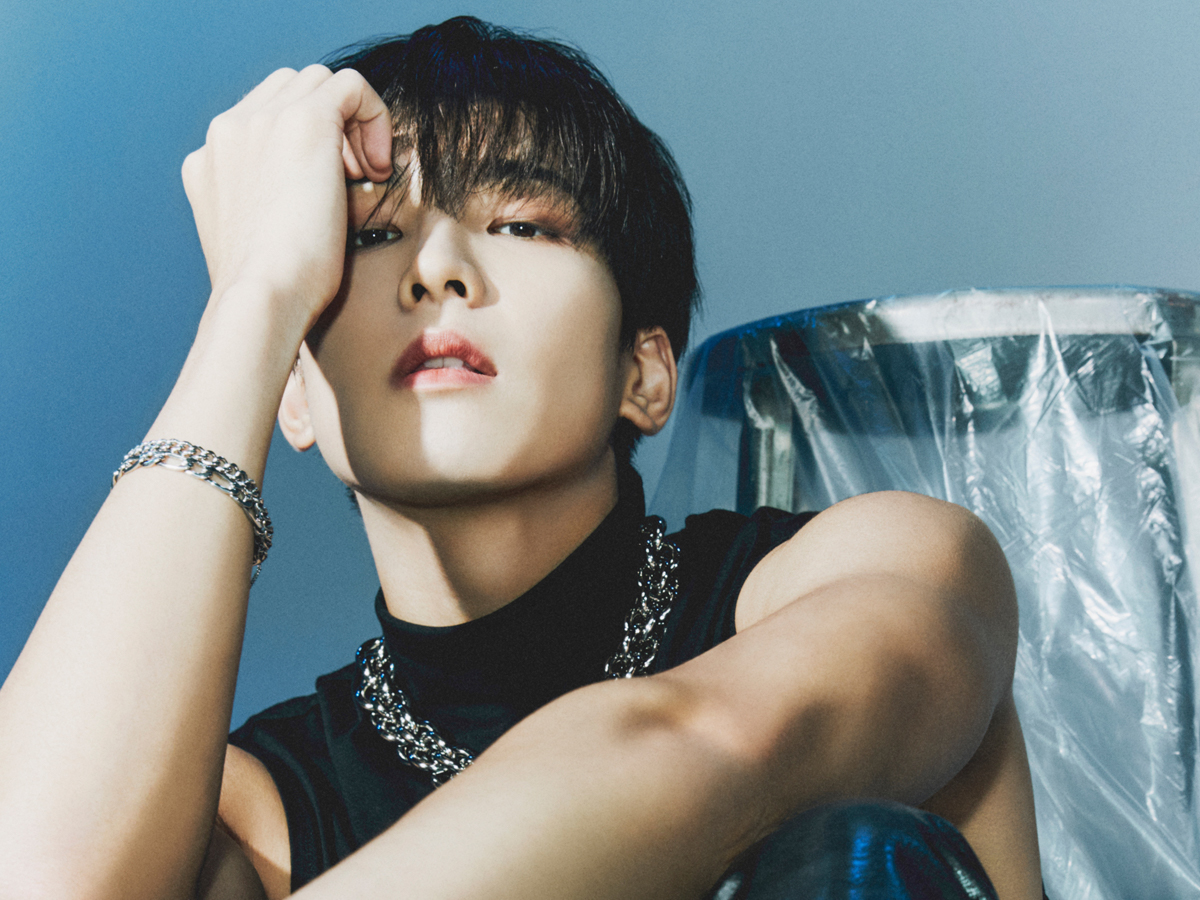
- DK: “I just want to believe in myself”2021.06.22
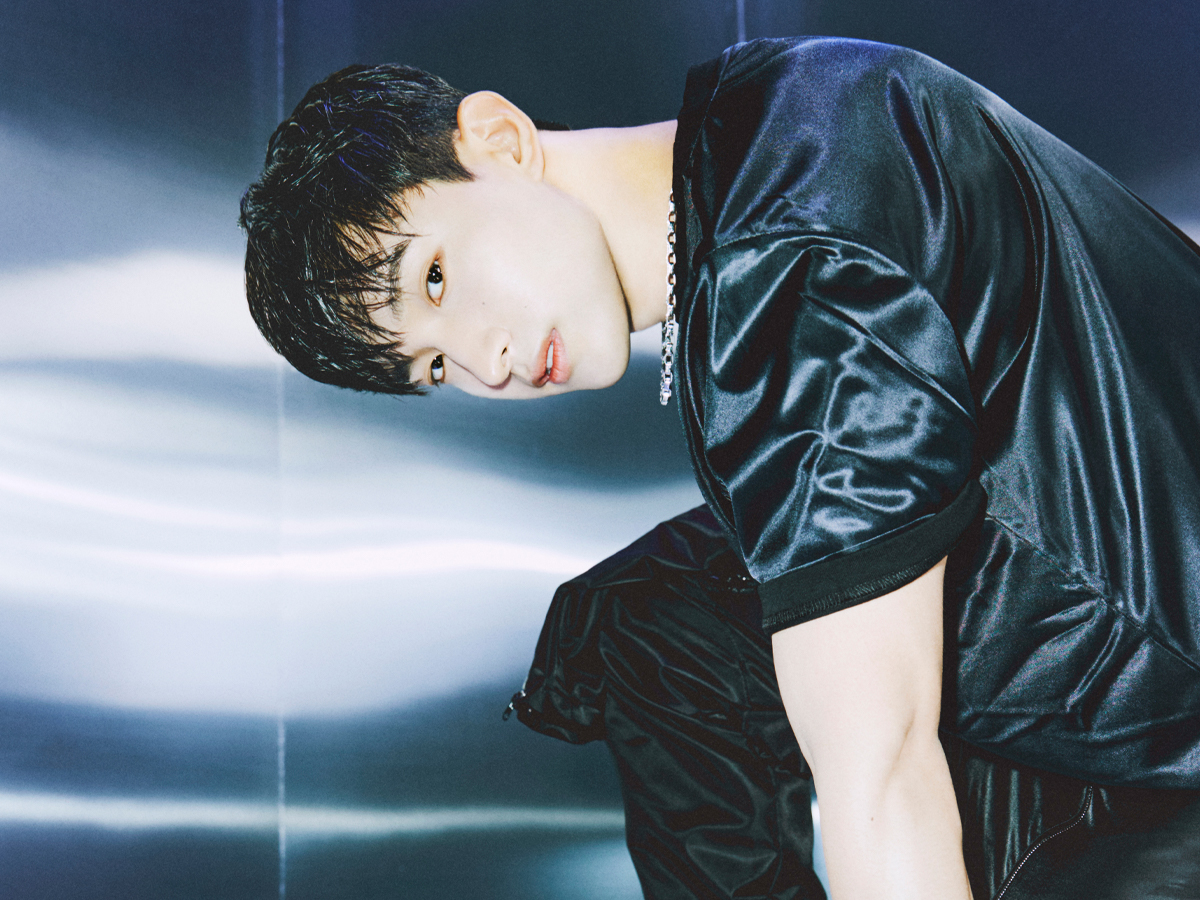
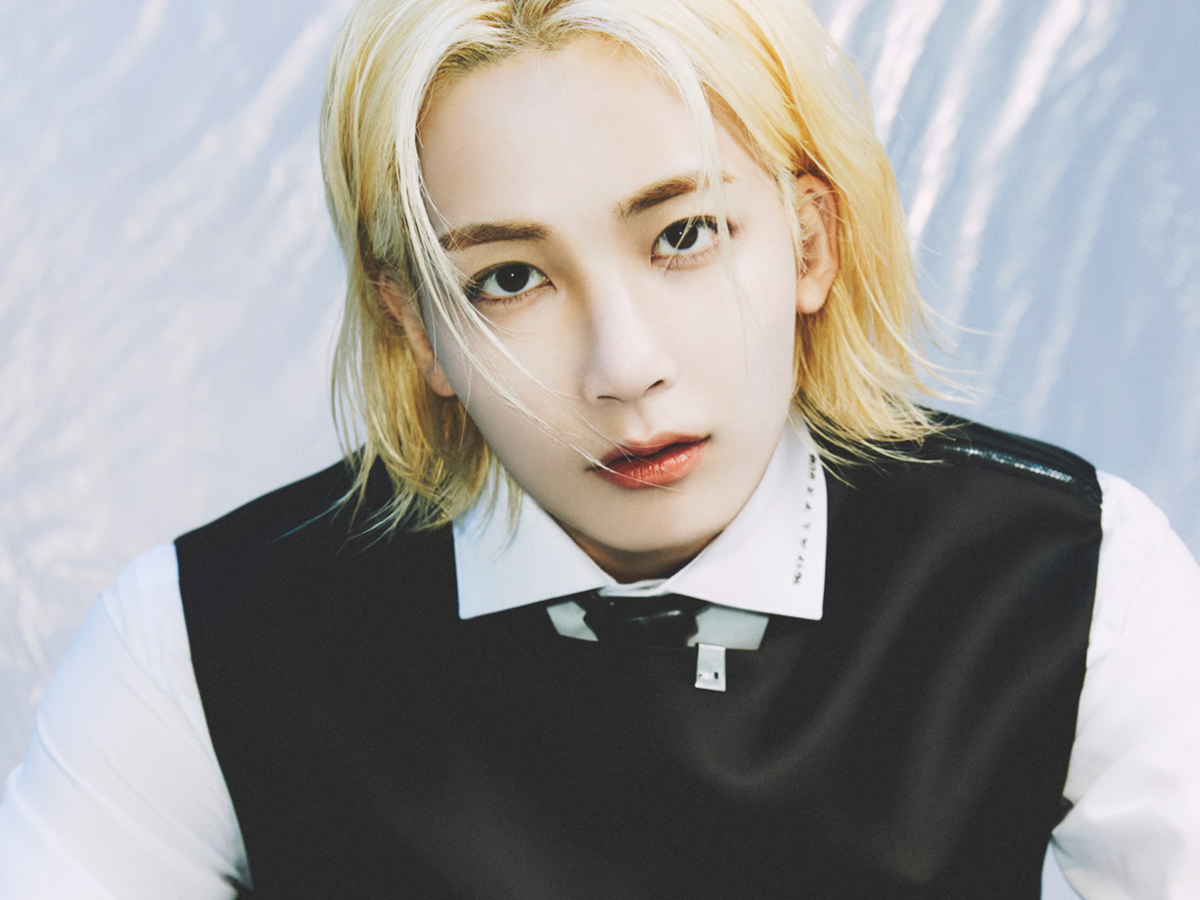
- VERNON: “I’m happy knowing who I am”2021.06.25
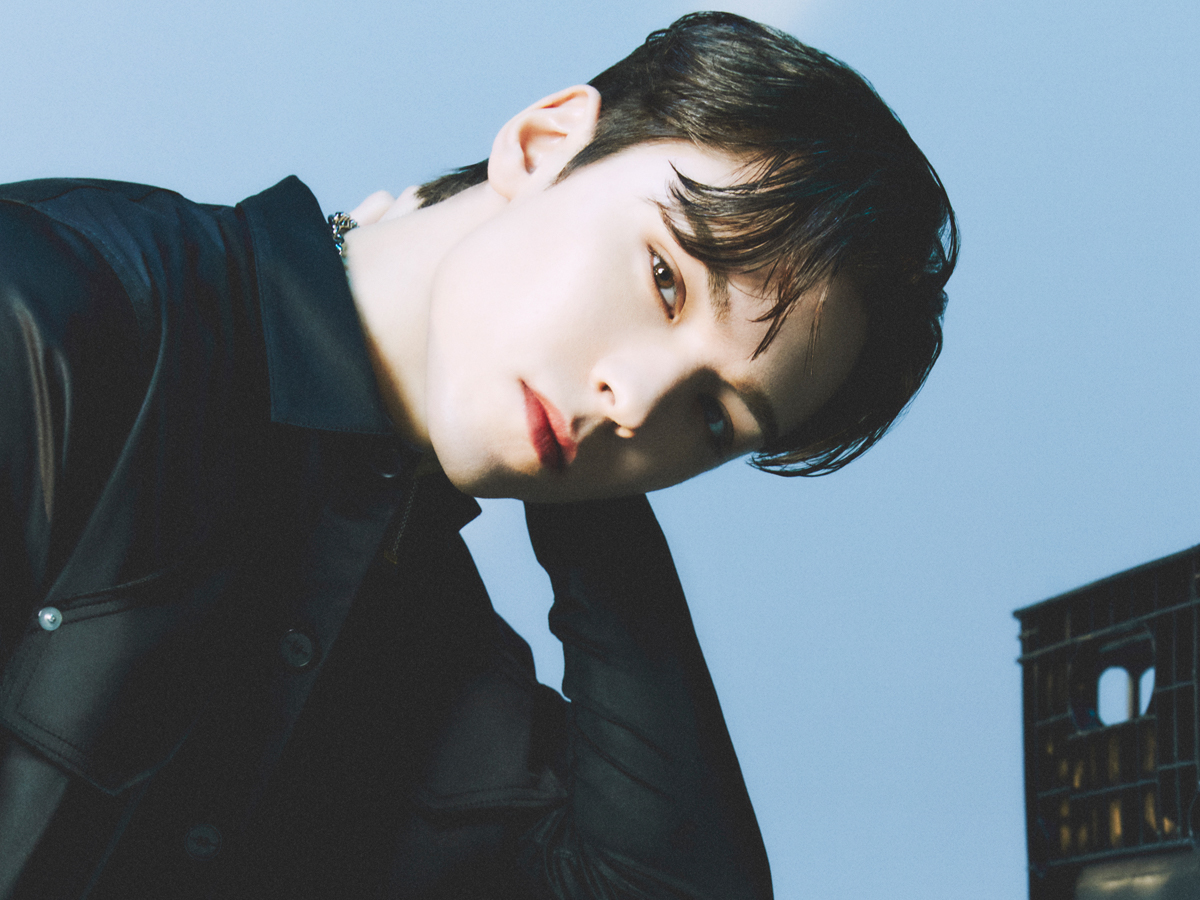
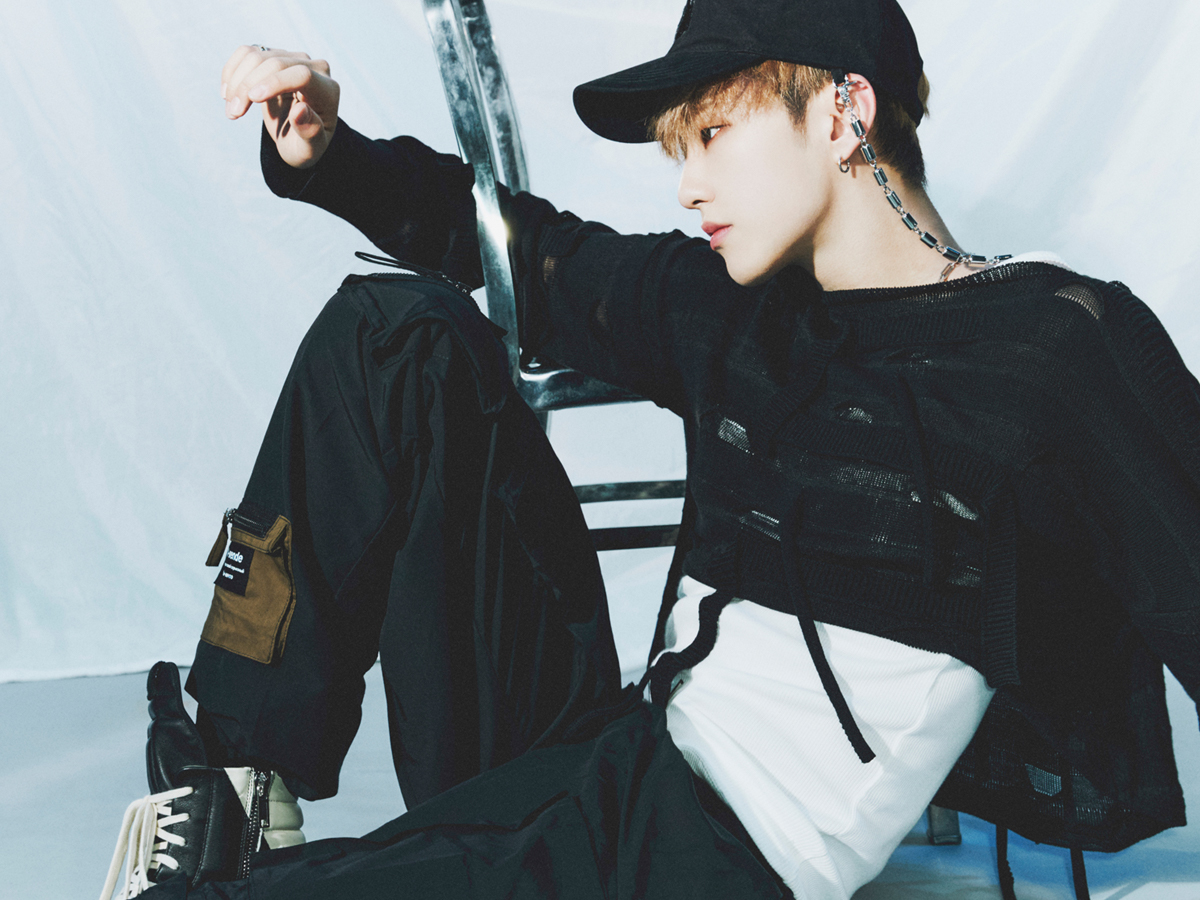
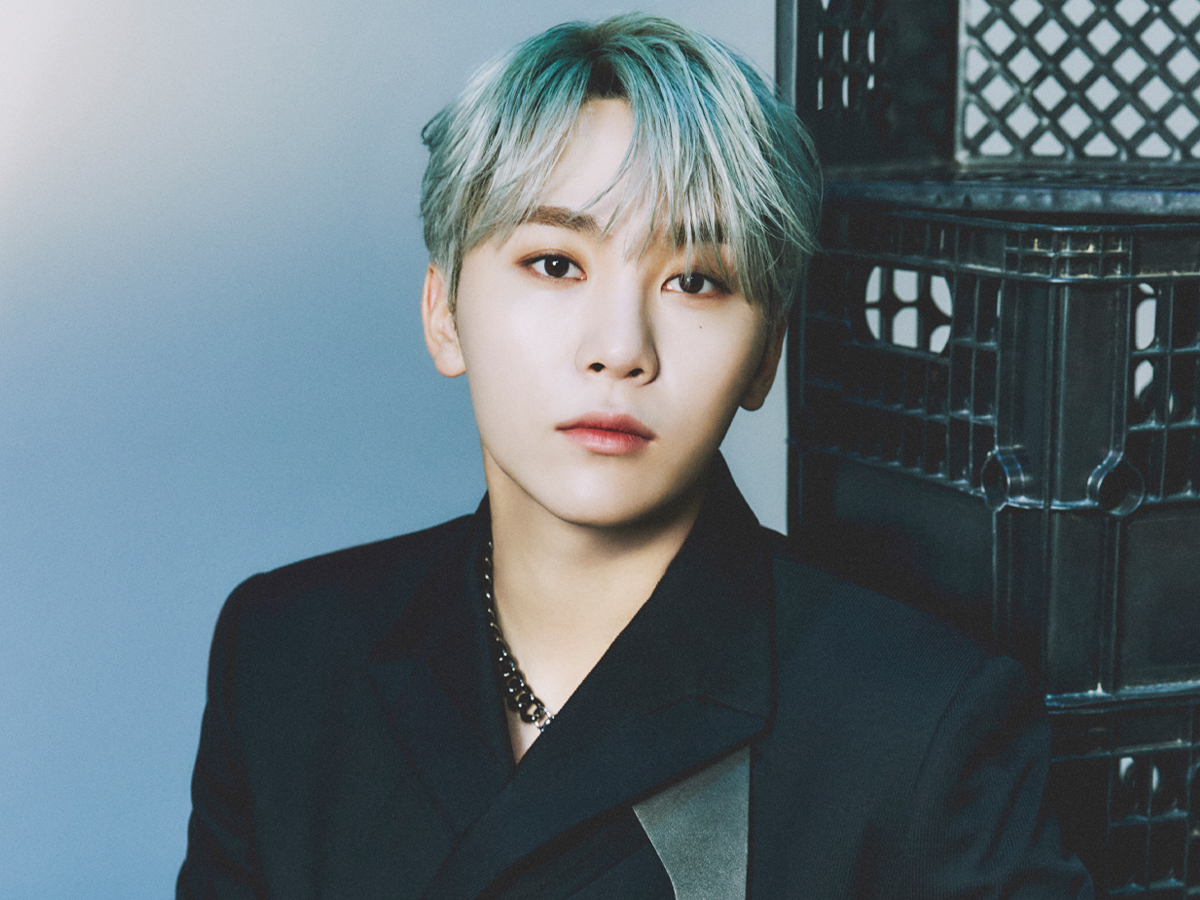
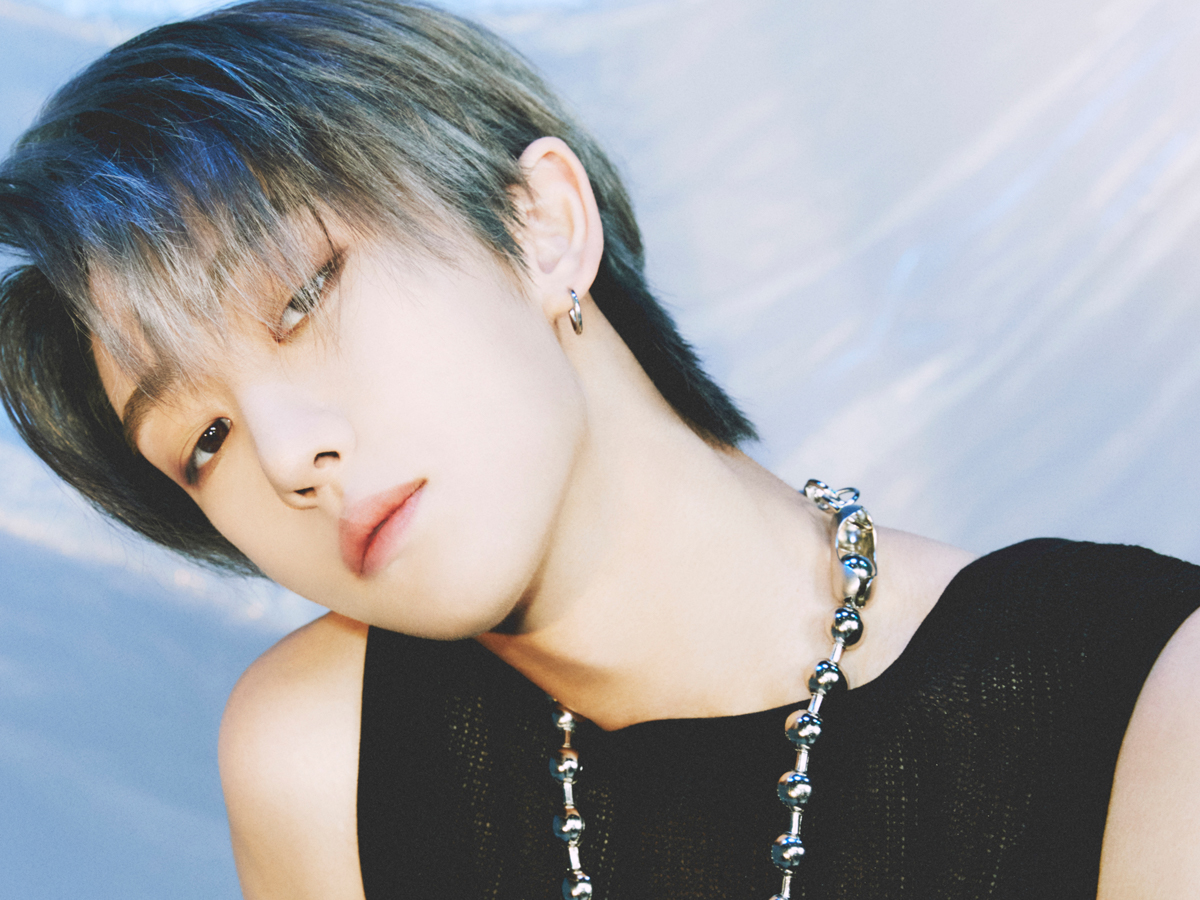
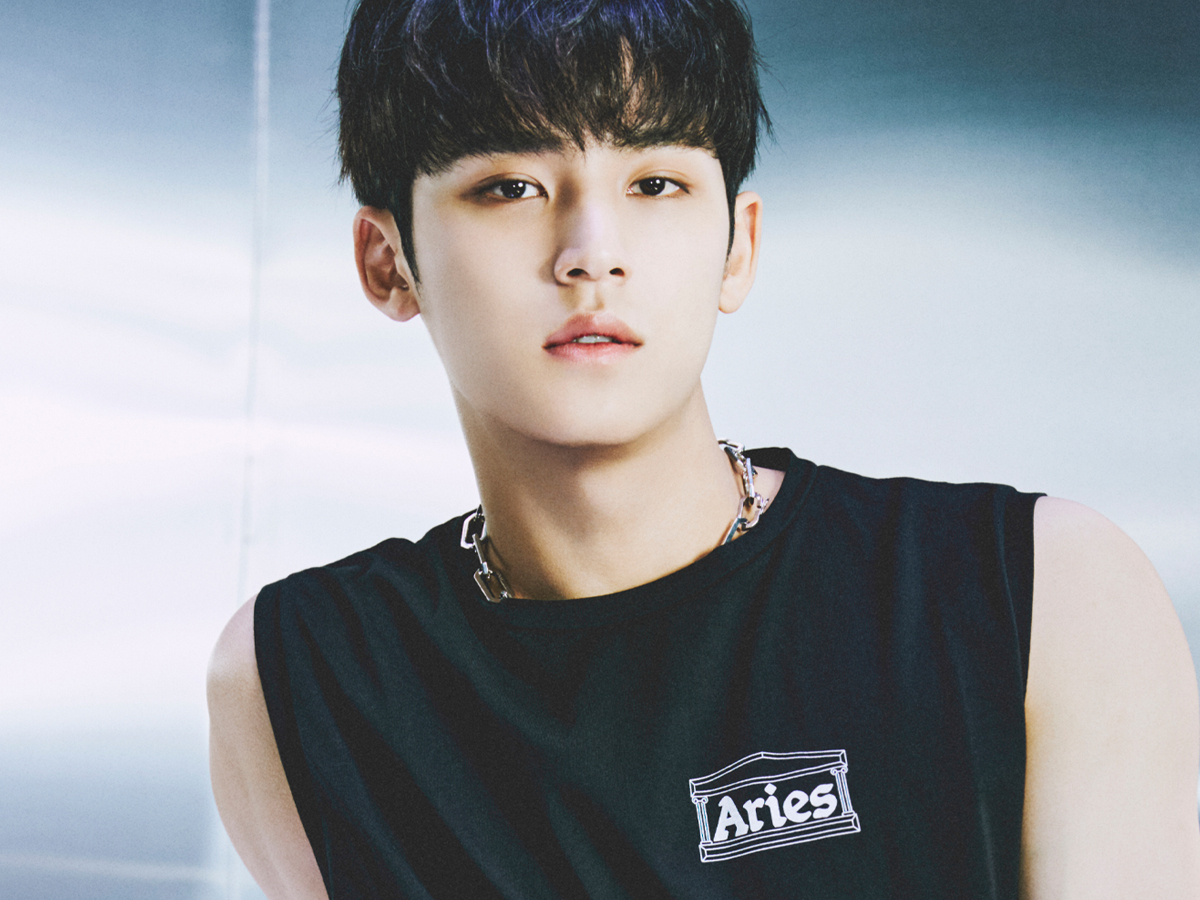
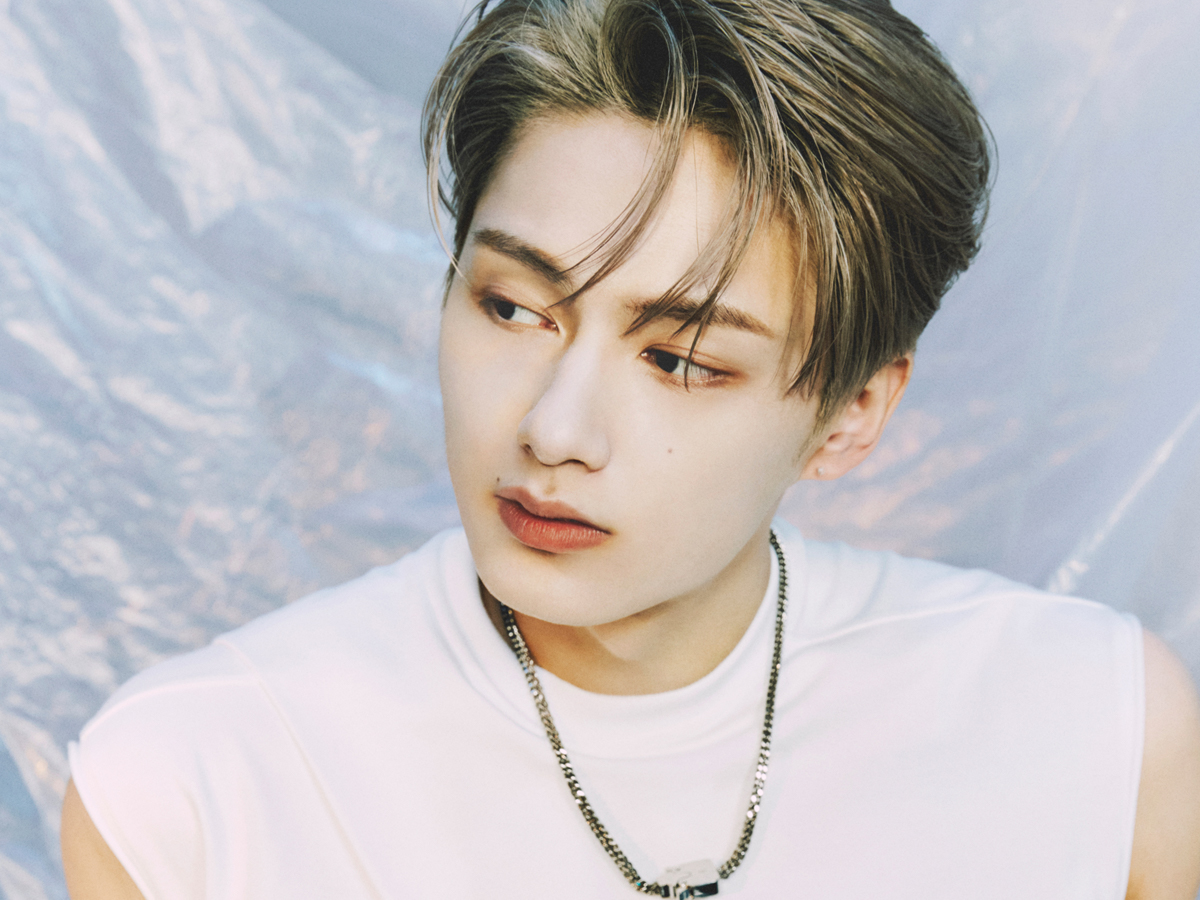
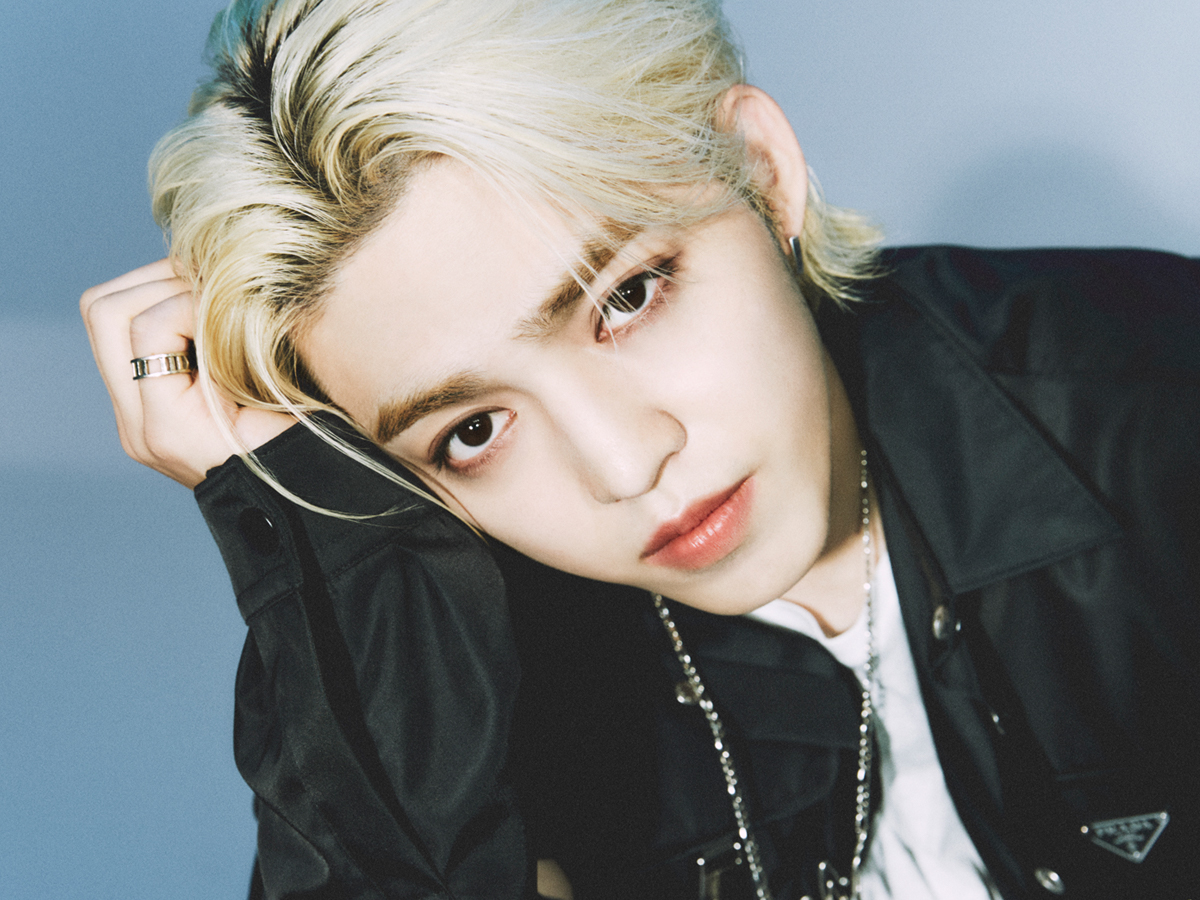
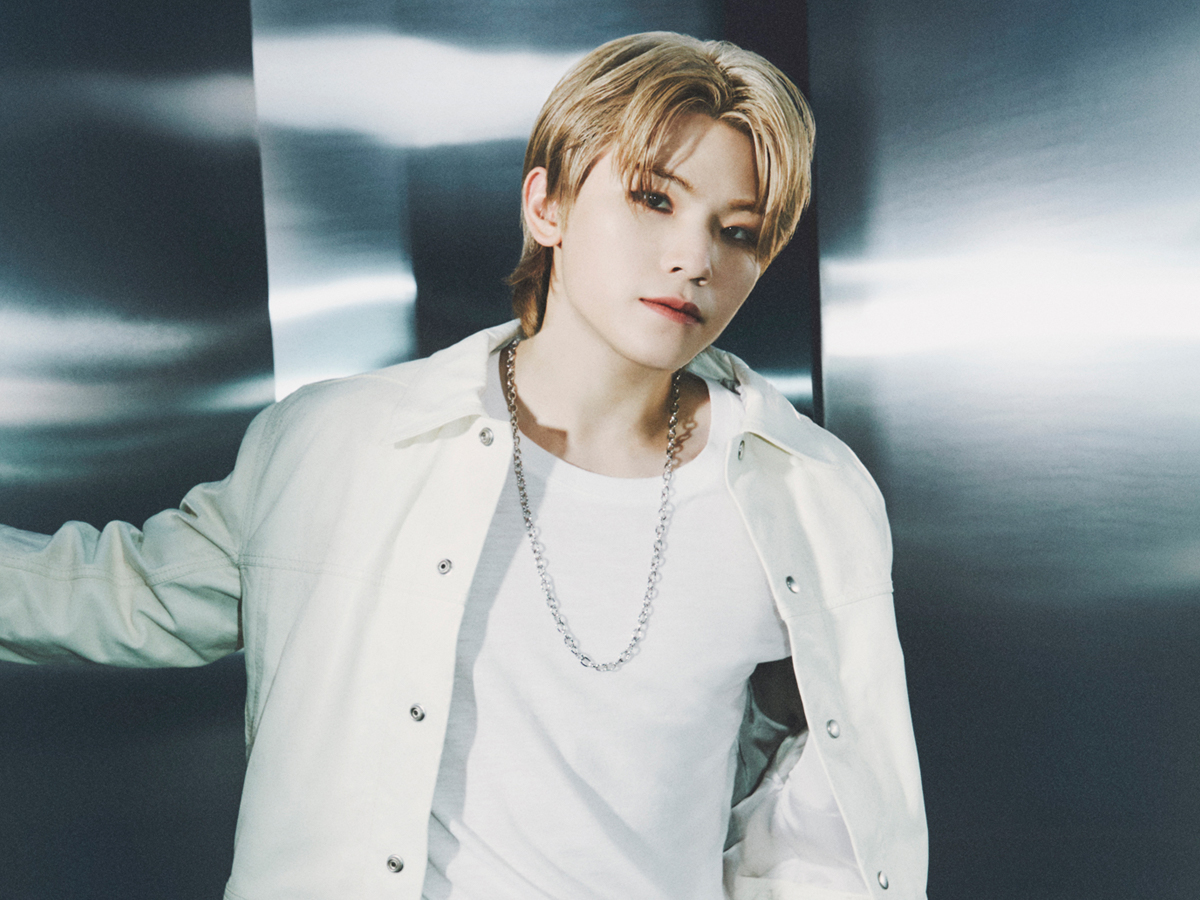
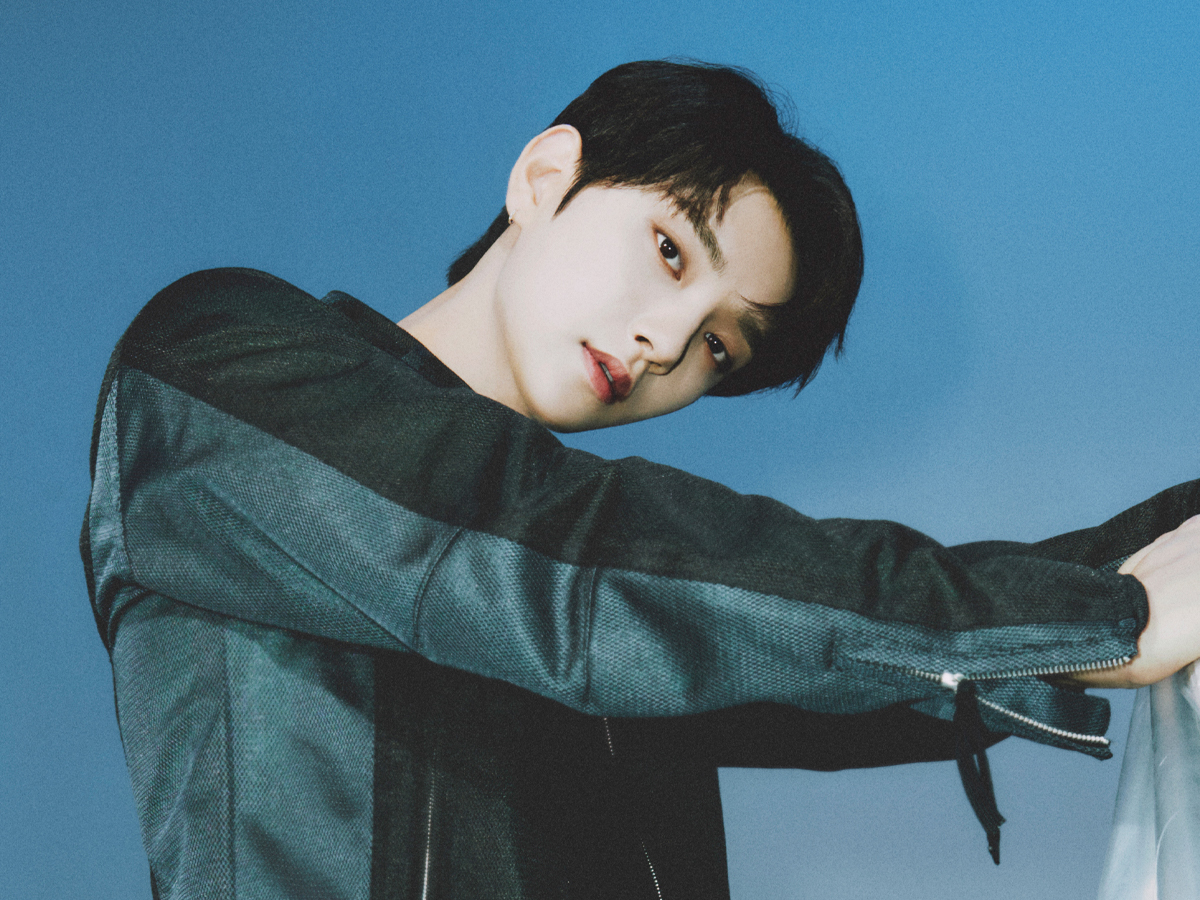
- SEVENTEEN Other Cuts2021.07.04
